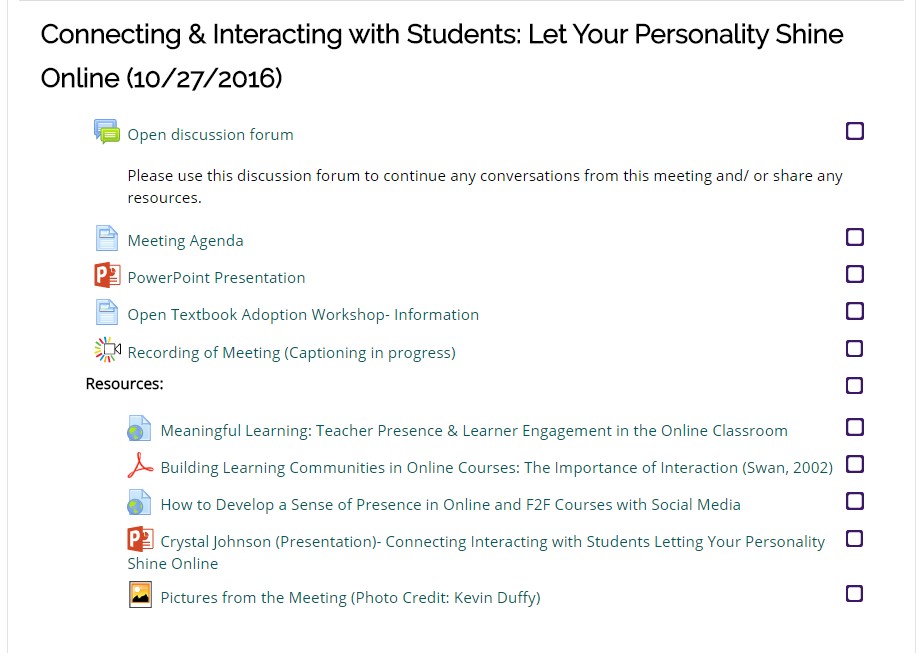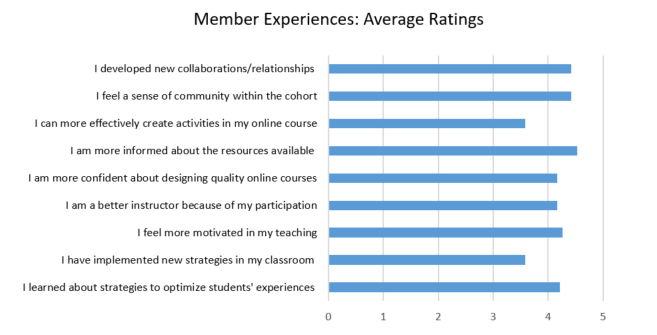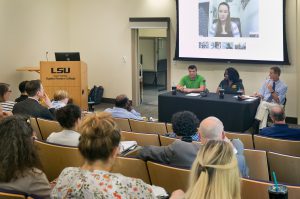How do faculty at your institution enhance their teaching skills or discuss best practices with their peers?
Today, we’re thrilled to learn about Louisiana State University’s Online Teaching Cohort program from Hala Esmail, the Manager of the Faculty Technology Center for LSU. This group meets several times a semester to hear presentations from experts, participate in demonstrations and hands-on activities, and discuss strategies with other cohort members. In her post, Hala also reviews the effectiveness of the cohorts and the lessons they’ve learned while offering the program. This is a great example of a professional development activity for your faculty and/or staff.
Thank you Hala for providing a wonderful overview of this highly successful program.
Enjoy the read and enjoy your day,
~Lindsey Downs, WCET
Since the 2011-2012 academic year, Louisiana State University (LSU) has experienced an approximate 500% increase in the number of blended and online courses offered. Many of the faculty offering these courses had no prior experience designing online courses. Through my work at the Faculty Technology Center (at the time I was an Educational Technology Consultant), faculty shared feelings of isolation and apprehension as they developed their blended and/or online courses. During this period of significant change, I began to think of ways to bring faculty together to share their expertise and experiences with the goal of supporting and enhancing online teaching at LSU.
During the 2015 Fall Semester, I collaborated with LSU Online and the LSU Learning and Teaching Collaborative to establish the LSU Online Teaching Cohort (OTC), a faculty learning community. According to Cox (2004), faculty learning communities can “include many bridges linking faculty to deep learning, early-career faculty to experienced faculty, isolated teachers to new colleagues, departments to departments, disciplinary curricula to general education, and faculty to students and staff” (p. 18).
The primary purpose of the OTC is to offer an opportunity for the LSU campus community and faculty and staff at peer institutions to engage in discussions and activities through which members can share and learn online teaching strategies and practices to enhance their courses. Participating in the OTC provides members with opportunities to:
- Receive help from others to solve current online teaching challenges.
- Discuss strategies to effectively manage blended and online courses.
- Develop interdisciplinary collaborations/relationships with colleagues across campus and peer institutions.
- Enhance teaching skills to increase student success and retention.
- Be a part of a community of support amongst peers.
How it Works
The group meets three times a semester. Each meeting centers on a specific topic or focus previously determined by cohort members. Meetings can include presentations by guest speakers, demonstrations, or hands-on activities. Topics of past meetings include enhancing courses using video tools, engaging students in online discussions, facilitating group work online, enriching learning through feedback, and participating in dialogues with a faculty and student panels.
As interest grew on the LSU campus, it soon became clear that extending an invitation to others from surrounding campuses to join the cohort would not only provide a diverse perspective to the learning community, but would also assist those at other institutions with limited support resources. I sent invitations to faculty and staff at various institutions- focusing on those within the LSU system and/or within the Baton Rouge area. The cohort currently consists of over 170 members (primarily faculty and staff) across a variety of disciplines, including peers from Southern University, Franciscan Missionaries of Our Lady University, LSU Alexandria, LSU Eunice, LSU Shreveport, and Baton Rouge Community College. A Moodle course was created to assist in the communication, resource sharing, archival, and assessment efforts of the cohort.

Additionally, a Policy Working Group was established as a result of several concerns and challenges discussed at the initial meeting. The purpose of the group is to participate in conversations about online teaching policies at LSU from the faculty perspective and to provide policy recommendations to Academic Affairs for topics discussed to offer consistency of practice across the university. The group was influential in affecting change (e.g., updating a university policy related to attendance for online courses) and in the 2017 Fall Semester it was integrated under a different umbrella within the LSU organization.
Is it Effective?
Attendance records have allowed me to reach out to those with minimal attendance to ensure their needs are being met. A survey was administered to members after each academic year, providing feedback used to better serve the needs of the group. Responses from surveys included the following comments:
- “I really enjoy the sense of community I encounter at each meeting. It is a great atmosphere to learn and grow together.”
- “As of yet, I do not teach an online course; however, I feel being part of this cohort is preparing me for online teaching.”
- “I was impressed with the [student] panel discussion on April 18th… Looking forward to being more active this coming year and learning how to integrate this into my teaching.”
- “I love the online session. I have participated in most of them. It is very beneficial and I am applying some concepts/methods that I have learned.”
The graph below illustrates responses to the survey item “Please respond to the statements below regarding your experiences as a member of the Online Teaching Cohort.”

(Graph 1) Likert scale: 5= Strongly agree, 4= Agree, 3=Neither agree nor disagree, 2= Disagree, 1= Strongly disagree.
To mix things up a bit, I led an OTC book club in the summer of 2017 targeted at faculty and staff interested in learning more about online teaching and learning. Members of the LSU campus as well as surrounding campuses participated. What made things more exciting was Rolando Garza from Texas A&M University-Kingsville (TAMUK) reached out to me after seeing this tweet and expressed his interest in forming a similar book club at his campus.

He asked if we would be interested in collaborating. The book clubs at LSU and TAMUK connected through synchronous online meetings three times during the summer.
In the photo to the right, this student panel event was one of the most popular OTC meetings. Two students joined us remotely from different parts of the country.
Attendees commented on how much they enjoyed hearing from students about their experiences and perspectives.
Lessons Learned and Ideas for Moving Forward
Are you interested in organizing a faculty learning community? It can be done with a minimal budget. Funds were used primarily to purchase refreshments for meetings and for books for the book club.
Since this is a collaborative effort, it provided the opportunity for the three units to share resources. While it has not demanded an extensive budget, it can take significant time in the organization and planning of meetings/events. I recommend being cognizant of this when implementing a similar community and further recommend that staff involved share these responsibilities.
Based on feedback from participants, several ideas for the future include collaborating with colleagues from other institutions, inviting guest speakers to present (via web conferencing), and incorporating more hands-on experiences during meetings/events. If you have any ideas or would like to share your experiences with being a part of a faculty learning community, I would love to hear it!
Hala W. Esmail
Manager, Faculty Technology Center
Louisiana State University
hesmai1@lsu.edu @halawesmail
Cited works:
Cox, M. D. (2004). Introduction to faculty learning communities. New Directions for Teaching and Learning, (97), 5–23.



1 reply on “Supporting Faculty Through a Learning Community”
[…] Community of Practice (CoP) for faculty, similar to the faculty learning community described in an earlier WCET blog. We held monthly meetings to bring faculty together to develop best practices in a collaborative […]